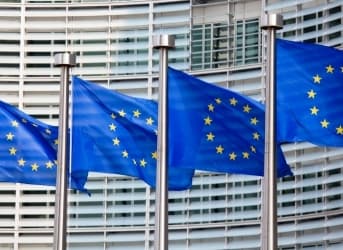BRATISLAVA, Slovakia -- Europe, at present the world's largest market and largest economic bloc, is in decline and living standards are in danger. That was the sober message at an energy conference here, delivered by a battery of speakers from across eastern Europe.
The narrative is that energy is what is dragging Europe down – not low birthrates and pervasive social-safety networks, but increasing dependence on expensive energy imports and hopelessly tangled markets.
Although delegates gathered to discuss the particular problems of eastern Europe, many had comments about the energy dependence across Europe; its labyrinthine regulations in nearly all 28 countries, its inability to form capital for large projects like nuclear, and governments intruding into the market.
Related article: New Study Finds Higher Methane Emissions from Fracking
The result is a patchwork of contradictions, counterproductive regulations, political fiats and multiple objectives that leave Europeans paying more for energy than they need to and failing to develop indigenous sources, such as their own shale gas deposits in Ukraine and Poland. It also leaves countries dependent on capricious and expensive gas from Russia, unsure of whether they can build needed electric generating plant in the future and poorly interconnected, sometimes by both gas pipelines and electric lines.
Good intentions have also had their impact. The European Commission has pushed renewable energy and subsidized these at the cost of others. The result is imperfect markets and, more important, imperfectly engineered systems.
Germany and other countries are dealing with what is called “loop flow” – when the renewables aren't performing, either because the wind has dropped or the sun has set, fossil fuels plants have to be activated. This means that renewable systems are often shadowed by old-fashioned gas and coal generation that has to be built, but which isn't counted toward the cost of the renewable generation.
With increasing use of wind, which is the most advanced renewable, the problem of loop flow is increased, pushing up the price of electricity. Germany is badly affected and the problem is getting worse because it heavily committed to wind after abandoning nuclear, following the Fukusima-Daiichi accident in Japan.
Frank Umbach, associate director of the European Center for Energy and Resource Security at King's College, London, said energy costs in Germany are now driving manufacturing out of the country and to the United States.
Umbach said that as Britain de-industrialized 15 years ago, Germany was beginning to go the same way. He said Britain had been able to sustain itself through financial services and other service-sector jobs, but that was not a prospect for Germany, the industrial mainstay of the European Union. Now Britain, with its new nuclear policy, is trying to re-industrialize, he said.
Umbach urged that Europe get serious about shale gas and even burning coal. His argument was that there are environment safeguards available and that more are being developed, such as the new less environmentally assaulting techniques in hydraulic fracturing (fracking) used to extract tightly bound natural gas from shale formations.
Related article: PetroChina to Buy Exxon Stake in Iraqi Oil Field
Several speakers said the region has to face the reality that it is no longer able to generate the capital it needs for liquified natural gas terminals, nuclear power plants and unconventional gas recovery in Ukraine, Poland and in the Black Sea offshore Romania and Bulgaria.
Many countries, particularly in eastern Europe, still balk at foreign ownership of their energy infrastructure and have actively driven away investment. Poland, for example, has frightened off shale gas developers from the United States by insisting that as the resource is developed, 50 percent of the developing company must be ceded to the state. The companies left.
In other places, the Czech Republic, for example, landowners have no claim to the resource under their land; that remains the property of the government and, therefore, they are hostile to any development on their property, whether it is for oil, gas or minerals.
ADVERTISEMENT
The United Kingdom, by contrast, declared a spokesman for its energy ministry, Hergen Haye, is open for business. That means if the Americans, the Chinese or the Middle Easterners want to “buy into” Britain's new nuclear undertaking, “they are welcome.”
Europe's sad energy situation was summed up by Iana Dreyer of the EU Institute for Security Studies. She said Europe is still the largest trading bloc in the world, the largest economic machine and the largest market, but that it is slipping. By 2030, she calculated, Europe will have slipped to No. 3, behind the China and the United States, unless it can untangle its energy Gordian knot.
By. Llewellyn King
Europeans here cite the United States as the way to go in energy. It makes a body feel good.
Llewellyn King is executive producer and host of “White House Chronicle” on PBS. His e-mail is lking@kingpublishing.com.



















Last week I attended an OEDC workshop where a pension fund manager proudly told us their investments were always made into A- companies minimum; or, of course, into government, (Sovereign), debt.
Ergo, those of us on the outside of the debate have no access to any form of free enterprise equity capital stock with which to build our own solutions. We either submit to private funding that insists upon full corporate control from the outset, or we try, always unsuccessfully, to try and gain the attention of a government source that is today, always targeted at funding existing prime corporations.
Why, when the majority of the finance of the planet is in the hands of the shadow banking industry; does everyone still expect that all such funding for new developments must stem from a government source spending borrowed money???
Some of us out here have potential solutions that no one has any access to as they are outside of the “belief” system created by government funding and we have no confidence whatever in the VC approach.
The problem is a lack of funding outside of existing spending and investment systems.